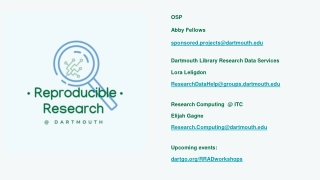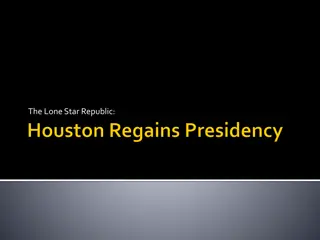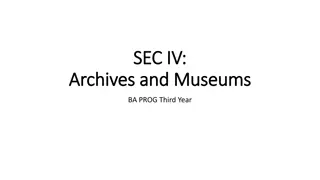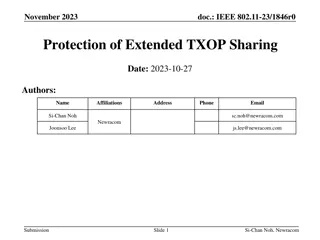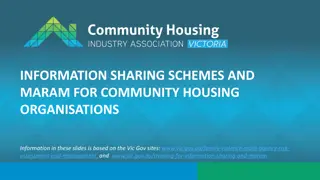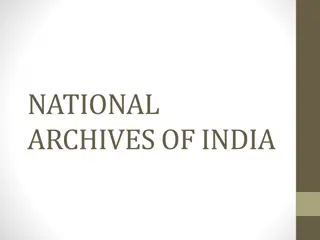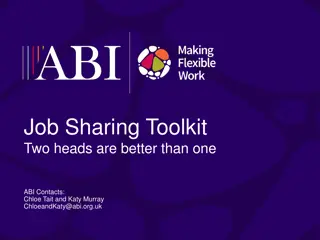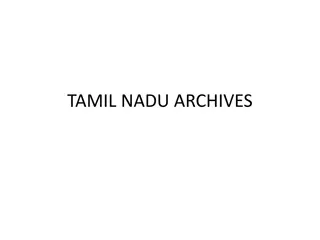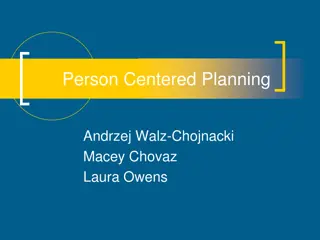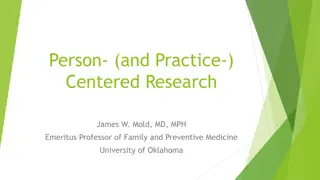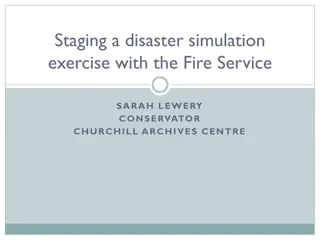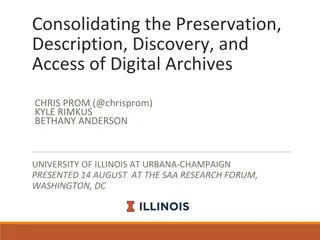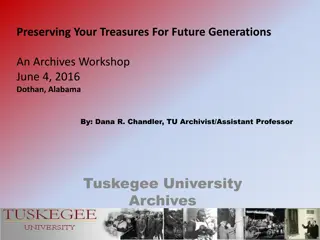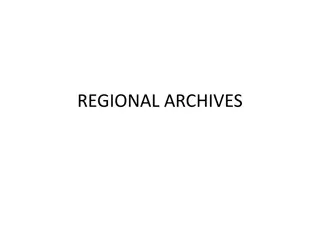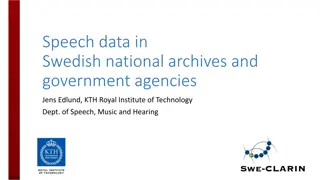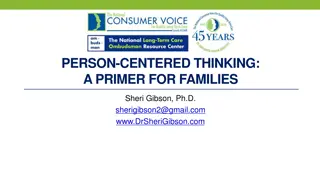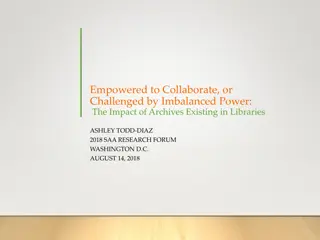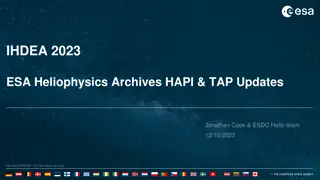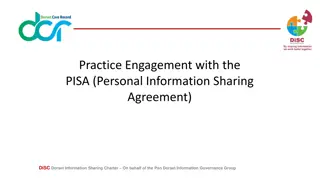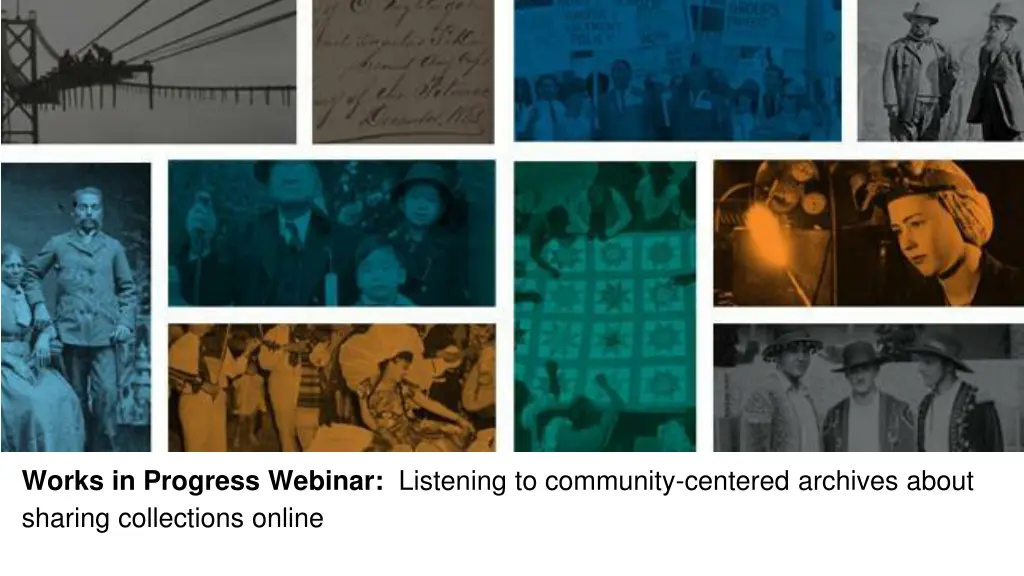
Community-Centered Archives: Transforming Education and History
Explore how Community-Centered Archives (CCAs) are reshaping education and preserving community history. Learn about collaborative partnerships, principles, and the impact on academic libraries and social justice scholarship.
Download Presentation

Please find below an Image/Link to download the presentation.
The content on the website is provided AS IS for your information and personal use only. It may not be sold, licensed, or shared on other websites without obtaining consent from the author. If you encounter any issues during the download, it is possible that the publisher has removed the file from their server.
You are allowed to download the files provided on this website for personal or commercial use, subject to the condition that they are used lawfully. All files are the property of their respective owners.
The content on the website is provided AS IS for your information and personal use only. It may not be sold, licensed, or shared on other websites without obtaining consent from the author.
E N D
Presentation Transcript
Works in Progress Webinar: Listening to community-centered archives about sharing collections online
Who We Are Madelynn Dickerson (she/her) University of California, Irvine Christine Kim (she/her) California Digital Library Sharon Mizota (she/her) Consultant Audra Eagle Yun (she/her) University of California, Irvine Rivka Arbetter Krystal Tribbett (she/her) University of California, Irvine University of California, Irvine
Todays Agenda Introducing C-CAP TEACH & The Research Doing the Work: A Tale of Three Pivots Pivot 1: Breaking Up With a Research Partner Pivot 2: Re-scoping the Research Questions Pivot 3: Different Deliverables Reflection
Introducing CCAP TEACH & The Research
Community-Centered Archives in Practice Transforming Education, Archives, and Community History C-CAP TEACH will cultivate commitment among higher education institutions to community-centered archives approaches, simultaneously solidifying the ability and responsibility of academic libraries to engage critically and contribute to social justice-focused scholarship, training, pedagogy, and partnerships in their communities. https://sites.uci.edu/ccap/ https://sites.uci.edu/ccap/ UCI Community-Centered Archives in Practice: Transforming Education, Archives, and Community History https://sites.uci.edu/ccap/
What are CCAs? We define community-centered archives (CCAs) as organizations documenting the lives of underrepresented, marginalized, or disenfranchised people including Community- Based Archives (CBAs) with archival work as mission-centric or Community-Based Organizations (CBOs) where archival work is not mission-centric but that are doing archival projects.
Principles of community-centered archives partnerships Collaborative through shared authority with community members Attentive to inequities reflected in archives Responsive to the community s needs Engaging with the divergent priorities of communities https://ocseaa.lib.uci.edu/partnerships Principles of community-centered archives partnerships https://ocseaa.lib.uci.edu/partnerships
Research Assessment Project Goals: Understand the ways regional and national digital collection aggregators can work towards more representative and inclusive aggregation Support the development of a more responsible and inclusive framework for digital exhibitions, or online storytelling
Research Methods & Outcomes Sharing Your Stories Online: A Guide for Community Organizations and Their Partners https://bit.ly/3CHtWgF Research Reports Environmental Scan: http://bit.ly/4767IP8 DPLA Hubs & Community Archives Surveys: https://bit.ly/4hgnEDX Community Archives & Curator Interviews: https://bit.ly/3EjaEyI Analysis of institution types in the national (DPLA) aggregation [in progress]
What we planned Grant Proposal Milestone 1 Milestone 2 Milestone 3 Results
What actually happened. Pivot 3 Pivot 1 Grant Proposal Results Pivot 2
Pivot 1: Breaking Up with a Research Partner
The Original Plan 1. Hold informational interviews with multiple potential consultants 2. Solicit project proposals 3. Select a consultant 4. Onboard partner as vendor with library business office 5. Meet with consultant to initiate project 6. Hold regular check-ins, be available to answer questions 7. Receive deliverable: a white paper or report based on research findings
The Pivot: Making a Difficult Decision Relationship with original consultant was feeling strained Misalignment of values and expectations Bureaucracy supported status quo Making a change felt difficult and disruptive Ultimately decided to part ways When parting ways, everyone seemed relieved Now we needed a new consultant, which led to additional questions and challenges
Pivot 2: Re-scoping the Research Questions
Original Research Questions How can regional and national digital collection aggregators (e.g., DPLA, the DPLA Hubs Network, and other regional aggregators) work towards a more representative and inclusive aggregation? What is a responsible and inclusive digital exhibition framework that may amplify historically marginalized narratives?
Re-scoped Research Question How can institutions and community-centered archives develop reciprocal partnerships that support online storytelling through digital primary sources?
The Pivot: Its Okay to Start Over Learning is an iterative process It s okay to reset, re-center, and start over Doing the work right is more important than meeting a timeline Mapping out a strategy with your collaborator is crucial to any partnership Look to your guiding principles often Crucial for leadership to support an environment of adaptation Listening - really listening - is being willing to learn, re-center, and adapt
Pivot 3: Different Deliverables
Our Original Intention Project 1: Whitepaper on research findings Project 2: A guide to creating ethical online exhibitions Build on existing guides Emphasize ethics, relationships, & responsibility Make online exhibitions more friendly & accessible
The Pivot: Listening to Community Respondents Lack of consensus on online exhibitions and aggregators Most were not creating or participating in them No bandwidth or resources Didn t serve their missions or audiences Had negative experiences Frustrations with collaborations & partners Curators focused on relationships & support, not prescriptions or how-to Community organizations don t need help with ethics. They need resources. Larger institutions have resources. They need help with ethics.
Sharing Your Stories Online: A guide for community organizations and their partners Concise, straightforward definitions FAQ format Pros, cons & considerations Guidelines for partnerships from both sides Resource lists
For institutions interested in partnering with a community organization What are your institution s values and principles? Do you respect the partner s autonomy and expertise? How do you find a partner? Are you in it for the long term? Is the partnership reciprocal? Can you be flexible? Are you listening to the partner? Do you understand that community is complicated? Are you communicating transparently and in a timely manner? Are you able to do what you promise?
Reflection Necessity of supportive leadership Following the CCAP methodology: CARE Collaborative Listening to CCAs Attentive Taking to heart what they say Responsive Giving what is needed Engaging Accessible format & language Ongoing questioning and reevaluation: Embracing the messiness
Thank you! Sharing Your Stories Online : https://bit.ly/3CHtWgF CCAP Digital Collections and Exhibitions Research Project: https://bit.ly/3Ej5hj1 CCAP TEACH Project Website: https://sites.uci.edu/ccap/ Sharon Mizota, sharon@sharonmizota.com Christine Kim, christine.kim@ucop.edu Madelynn Dickerson, mrosed@uci.edu

